- Home
- Shirley Jackson
We Have Always Lived in the Castle Page 7
We Have Always Lived in the Castle Read online
Page 7
“Coming,” she said from upstairs. “Coming, Merricat.”
Uncle Julian was better later in the day, and sat out in the warm afternoon sun, hands folded in his lap, half-dreaming. I lay near him on the marble bench our mother had liked to sit on, and Constance knelt in the dirt, both hands buried as though she were growing, kneading the dirt and turning it, touching the plants on their roots.
“It was a fine morning,” Uncle Julian said, his voice going on and on, “a fine bright morning, and none of them knew it was their last. She was downstairs first, my niece Constance. I woke up and heard her moving in the kitchen—I slept upstairs then, I could still go upstairs, and I slept with my wife in our room—and I thought, this is a fine morning, never dreaming then that it was their last. Then I heard my nephew—no, it was my brother; my brother came downstairs first after Constance. I heard him whistling. Constance?”
“Yes?”
“What was the tune my brother used to whistle, and always off-key?”
Constance thought, her hands in the ground, and hummed softly, and I shivered.
“Of course. I never had a head for music; I could remember what people looked like and what they said and what they did but I could never remember what they sang. It was my brother who came downstairs after Constance, never caring of course if he woke people with his noise and his whistling, never thinking that perhaps I might still be asleep, although as it happened I was already awake.” Uncle Julian sighed, and lifted his head to look curiously, once, around the garden. “He never knew it was his last morning on earth. He might have been quieter, I think, if he did know. I heard him in the kitchen with Constance and I said to my wife—she was awake, too; his noise had awakened her—I said to my wife, you had better get dressed; we live here with my brother and his wife, after all, and we must remember to show them that we are friendly and eager to help out wherever we can; dress and go down to Constance in the kitchen. She did as she was told; our wives always did as they were told, although my sister-in-law lay in bed late that morning; perhaps she had a premonition and wanted to take her earthly rest while she could. I heard them all. I heard the boy go downstairs. I thought of dressing; Constance?”
“Yes, Uncle Julian?”
“I could still dress myself in those days, you know, although that was the last day. I could still walk around by myself, and dress myself, and feed myself, and I had no pain. I slept well in those days as a strong man should. I was not young, but I was strong and I slept well and I could still dress myself.”
“Would you like a rug over your knees?”
“No, my dear, I thank you. You have been a good niece to me, although there are some grounds for supposing you an undutiful daughter. My sister-in-law came downstairs before I did. We had pancakes for breakfast, tiny thin hot pancakes, and my brother had two fried eggs and my wife—although I did not encourage her to eat heavily, since we were living with my brother—took largely of sausage. Homemade sausage, made by Constance. Constance?”
“Yes, Uncle Julian?”
“I think if I had known it was her last breakfast I would have permitted her more sausage. I am surprised, now I think of it, that no one suspected it was their last morning; they might not have grudged my wife more sausage then. My brother sometimes remarked upon what we ate, my wife and I; he was a just man, and never stinted his food, so long as we did not take too much. He watched my wife take sausage that morning, Constance. I saw him watching her. We took little enough from him, Constance. He had pancakes and fried eggs and sausage but I felt that he was going to speak to my wife; the boy ate hugely. I am pleased that the breakfast was particularly good that day.”
“I could make you sausage next week, Uncle Julian; I think homemade sausage would not disagree with you if you had very little.”
“My brother never grudged our food if we did not take too much. My wife helped to wash the dishes.”
“I was very grateful to her.”
“She might have done more, I think now. She entertained my sister-in-law, and she saw to our clothes, and she helped with the dishes in the mornings, but I believe that my brother thought that she might have done more. He went off after breakfast to see a man on business.”
“He wanted an arbor built; it was his plan to start a grape arbor.”
“I am sorry about that; we might now be eating jam from our own grapes. I was always better able to chat after he was gone; I recall that I entertained the ladies that morning, and we sat here in the garden. We talked about music; my wife was quite musical although she had never learned to play. My sister-in-law had a delicate touch; it was always said of her that she had a delicate touch, and she played in the evenings usually. Not that evening, of course. She was not able to play that evening. In the morning we thought she would play in the evening as usual. Do you recall that I was very entertaining in the garden that morning, Constance?”
“I was weeding the vegetables,” Constance said. “I could hear you all laughing.”
“I was quite entertaining; I am happy for that now.” He was quiet for a minute, folding and refolding his hands. I wanted to be kinder to him, but I could not fold his hands for him, and there was nothing I could bring him, so I lay still and listened to him talk. Constance frowned, staring at a leaf, and the shadows moved softly across the lawn.
“The boy was off somewhere,” Uncle Julian said at last in his sad old voice. “The boy had gone off somewhere—was he fishing, Constance?”
“He was climbing the chestnut tree.”
“I remember. Of course. I remember all of it very clearly, my dear, and I have it all down in my notes. It was the last morning of all and I would not like to forget. He was climbing the chestnut tree, shouting down to us from very high in the tree, and dropping twigs until my sister-in-law spoke sharply to him. She disliked the twigs falling into her hair, and my wife disliked it too, although she would never have been the first to speak. I think my wife was civil to your mother, Constance. I would hate to think not; we lived in my brother’s house and ate his food. I know my brother was home for lunch.”
“We had a rarebit,” Constance said. “I had been working with the vegetables all morning and I had to make something quickly for lunch.”
“It was a rarebit we had. I have often wondered why the arsenic was never put into the rarebit. It is an interesting point, and one I shall bring out forcefully in my book. Why was the arsenic not put into the rarebit? They would have lost some hours of life on that last day, but it would all have been over with that much sooner. Constance, if there is one dish you prepare which I strongly dislike, it is a rarebit. I have never cared for rarebit.”
“I know, Uncle Julian. I never serve it to you.”
“It would have been most suitable for the arsenic. I had a salad instead, I recall. There was an apple pudding for dessert, left over from the night before.”
“The sun is going down.” Constance rose and brushed the dirt from her hands. “You’ll be chilly unless I take you indoors.”
“It would have been far more suitable in the rarebit, Constance. Odd that the point was never brought out at the time. Arsenic is tasteless, you know, although I swear a rarebit is not. Where am I going?”
“You are going indoors. You will rest in your room for an hour until your dinner, and after dinner I will play for you, if you like.”
“I cannot afford the time, my dear. I have a thousand details to remember and note down, and not a minute to waste. I would hate to lose any small thing from their last day; my book must be complete. I think, on the whole, it was a pleasant day for all of them, and of course it is much better that they never supposed it was to be their last. I think I am chilly, Constance.”
“You will be tucked away in your room in a minute.”
I came slowly behind them, unwilling to leave the darkening garden; Jonas came after me, moving toward the light in the house. When Jonas and I came inside Constance was just closing the door to Uncle Julian’s room, an
d she smiled at me. “He’s practically asleep already,” she said softly.
“When I’m as old as Uncle Julian will you take care of me?” I asked her.
“If I’m still around,” she said, and I was chilled. I sat in my corner holding Jonas and watched her move quickly and silently around our bright kitchen. In a few minutes she would ask me to set the table for the three of us in the dining room, and then after dinner it would be night and we would sit warmly together in the kitchen where we were guarded by the house and no one from outside could see so much as a light.
4
On Sunday morning the change was one day nearer. I was resolute about not thinking my three magic words and would not let them into my mind, but the air of change was so strong that there was no avoiding it; change lay over the stairs and the kitchen and the garden like fog. I would not forget my magic words; they were MELODY GLOUCESTER PEGASUS, but I refused to let them into my mind. The weather was uneasy on Sunday morning and I thought that perhaps Jonas would succeed after all in running up a storm; the sun shone into the kitchen but there were clouds moving quickly across the sky and a sharp little breeze that came in and out of the kitchen while I had my breakfast.
“Wear your boots if you wander today,” Constance told me.
“I don’t expect that Uncle Julian will sit outdoors today; it will be far too cool for him.”
“Pure spring weather,” Constance said, and smiled out at her garden.
“I love you, Constance,” I said.
“I love you too, silly Merricat.”
“Is Uncle Julian better?”
“I don’t think so. He had his tray while you were still asleep, and I thought he seemed very tired. He said he had an extra pill during the night. I think perhaps he is getting worse.”
“Are you worried about him?”
“Yes. Very.”
“Will he die?”
“Do you know what he said to me this morning?” Constance turned, leaning against the sink, and looked at me with sadness. “He thought I was Aunt Dorothy, and he held my hand and said, ‘It’s terrible to be old, and just lie here wondering when it will happen.’ He almost frightened me.”
“You should have let me take him to the moon,” I said.
“I gave him his hot milk and then he remembered who I was.”
I thought that Uncle Julian was probably really very happy, with both Constance and Aunt Dorothy to take care of him, and I told myself that long thin things would remind me to be kinder to Uncle Julian; this was to be a day of long thin things, since there had already been a hair in my toothbrush, and a fragment of a string was caught on the side of my chair and I could see a splinter broken off the back step. “Make him a little pudding,” I said.
“Perhaps I will.” She took out the long thin slicing knife and set it on the sink. “Or a cup of cocoa. And dumplings with his chicken tonight.”
“Do you need me?”
“No, my Merricat. Run along, and wear your boots.”
The day outside was full of changing light, and Jonas danced in and out of shadows as he followed me. When I ran Jonas ran, and when I stopped and stood still he stopped and glanced at me and then went briskly off in another direction, as though we were not acquainted, and then he sat down and waited for me to run again. We were going to the long field which today looked like an ocean, although I had never seen an ocean; the grass was moving in the breeze and the cloud shadows passed back and forth and the trees in the distance moved. Jonas disappeared into the grass, which was tall enough for me to touch with my hands while I walked, and he made small crooked movements of his own; for a minute the grass would all bend together under the breeze and then there would be a hurrying pattern across it where Jonas was running. I started at one corner and walked diagonally across the long field toward the opposite corner, and in the middle I came directly to the rock covering the spot where the doll was buried; I could always find it although much of my buried treasure was forever lost. The rock was undisturbed and so the doll was safe. I am walking on buried treasure, I thought, with the grass brushing against my hands and nothing around me but the reach of the long field with the grass blowing and the pine woods at the end; behind me was the house, and far off to my left, hidden by trees and almost out of sight, was the wire fence our father had built to keep people out.
When I left the long field I went between the four apple trees we called our orchard, and along the path toward the creek. My box of silver dollars buried by the creek was safe. Near the creek, well hidden, was one of my hiding places, which I had made carefully and used often. I had torn away two or three low bushes and smoothed the ground; all around were more bushes and tree branches, and the entrance was covered by a branch which almost touched the ground. It was not really necessary to be so secret, since no one ever came looking for me here, but I liked to lie inside with Jonas and know that I could never be found. I used leaves and branches for a bed, and Constance had given me a blanket. The trees around and overhead were so thick that it was always dry inside and on Sunday morning I lay there with Jonas, listening to his stories. All cat stories start with the statement: “My mother, who was the first cat, told me this,” and I lay with my head close to Jonas and listened. There was no change coming, I thought here, only spring; I was wrong to be so frightened. The days would get warmer, and Uncle Julian would sit in the sun, and Constance would laugh when she worked in the garden, and it would always be the same. Jonas went on and on (“And then we sang! And then we sang!”) and the leaves moved overhead and it would always be the same.
I found a nest of baby snakes near the creek and killed them all; I dislike snakes and Constance had never asked me not to. I was on my way back to the house when I found a very bad omen, one of the worst. My book nailed to a tree in the pine woods had fallen down. I decided that the nail had rusted away and the book—it was a little notebook of our father’s, where he used to record the names of people who owed him money, and people who ought, he thought, to do favors for him—was useless now as protection. I had wrapped it very thoroughly in heavy paper before nailing it to the tree, but the nail had rusted and it had fallen. I thought I had better destroy it, in case it was now actively bad, and bring something else out to the tree, perhaps a scarf of our mother’s, or a glove. It was really too late, although I did not know it then; he was already on his way to the house. By the time I found the book he had probably already left his suitcase in the post office and was asking directions. All Jonas and I knew then was that we were hungry, and we ran together back to the house, and came with the breeze into the kitchen.
“Did you really forget your boots?” Constance said. She tried to frown and then laughed. “Silly Merricat.”
“Jonas had no boots. It’s a wonderful day.”
“Perhaps tomorrow we’ll go to gather mushrooms.”
“Jonas and I are hungry today.”
By then he was already walking through the village toward the black rock, with all of them watching him and wondering and whispering as he passed.
It was the last of our slow lovely days, although, as Uncle Julian would have pointed out, we never suspected it then. Constance and I had lunch, giggling and never knowing that while we were happy he was trying the locked gate, and peering down the path, and wandering the woods, shut out for a time by our father’s fence. The rain started while we sat in the kitchen, and we left the kitchen door open so we could watch the rain slanting past the doorway and washing the garden; Constance was pleased, the way any good gardener is pleased with rain. “We’ll see color out there soon,” she said.
“We’ll always be here together, won’t we, Constance?”
“Don’t you ever want to leave here, Merricat?”
“Where could we go?” I asked her. “What place would be better for us than this? Who wants us, outside? The world is full of terrible people.”
“I wonder sometimes.” She was very serious for a minute, and then she turned and smiled at me. �
�Don’t you worry, my Merricat. Nothing bad will happen.”
That must have been just about the minute he found the entrance and started up the driveway, hurrying in the rain, because I had only a minute or two left before I saw him. I might have used that minute or two for so many things: I might have warned Constance, somehow, or I might have thought of a new, safer, magic word, or I might have pushed the table across the kitchen doorway; as it happened, I played with my spoon, and looked at Jonas, and when Constance shivered I said, “I’ll get your sweater for you.” That was what brought me into the hall as he was coming up the steps. I saw him through the dining-room window and for a minute, chilled, I could not breathe. I knew the front door was locked; I thought of that first. “Constance,” I said softly, not moving, “there’s one outside. The kitchen door, quickly.” I thought she had heard me, because I heard her move in the kitchen, but Uncle Julian had called at that moment, and she went in to him, leaving the heart of our house unguarded. I ran to the front door and leaned against it and heard his steps outside. He knocked, quietly at first and then firmly, and I leaned against the door, feeling the knocks hit at me, knowing how close he was. I knew already that he was one of the bad ones; I had seen his face briefly and he was one of the bad ones, who go around and around the house, trying to get in, looking in the windows, pulling and poking and stealing souvenirs.
He knocked again, and then called out, “Constance? Constance?”
Well, they always knew her name. They knew her name and Uncle Julian’s name and how she wore her hair and the color of the three dresses she had to wear in court and how old she was and how she talked and moved and when they could they looked close in her face to see if she was crying. “I want to talk to Constance,” he said outside, the way they always did.

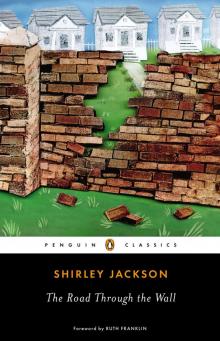 The Road Through the Wall
The Road Through the Wall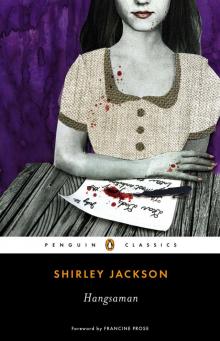 Hangsaman
Hangsaman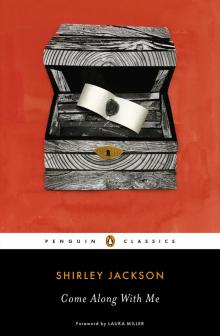 Come Along With Me
Come Along With Me The Lottery
The Lottery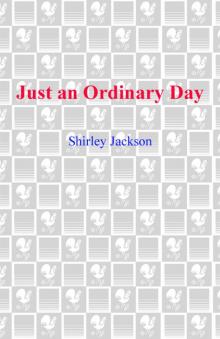 Just an Ordinary Day: Stories
Just an Ordinary Day: Stories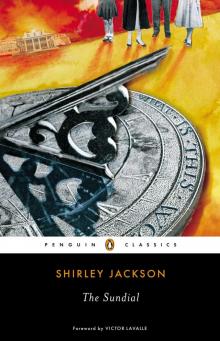 The Sundial
The Sundial Dark Tales
Dark Tales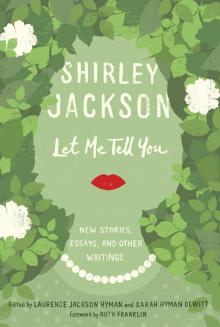 Let Me Tell You: New Stories, Essays, and Other Writings
Let Me Tell You: New Stories, Essays, and Other Writings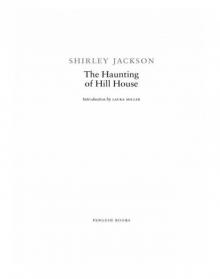 The Haunting of Hill House
The Haunting of Hill House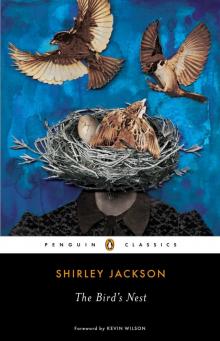 The Bird's Nest
The Bird's Nest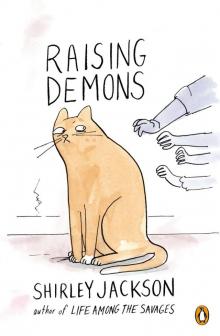 Raising Demons
Raising Demons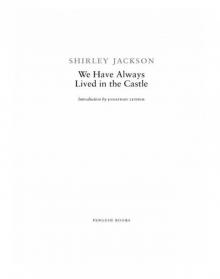 We Have Always Lived in the Castle
We Have Always Lived in the Castle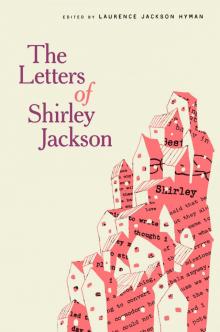 The Letters of Shirley Jackson
The Letters of Shirley Jackson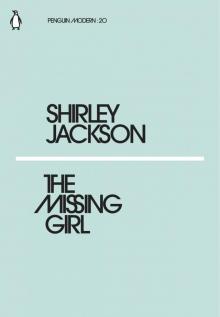 The Missing Girl
The Missing Girl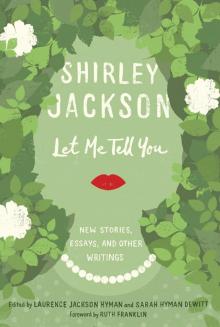 Let Me Tell You
Let Me Tell You